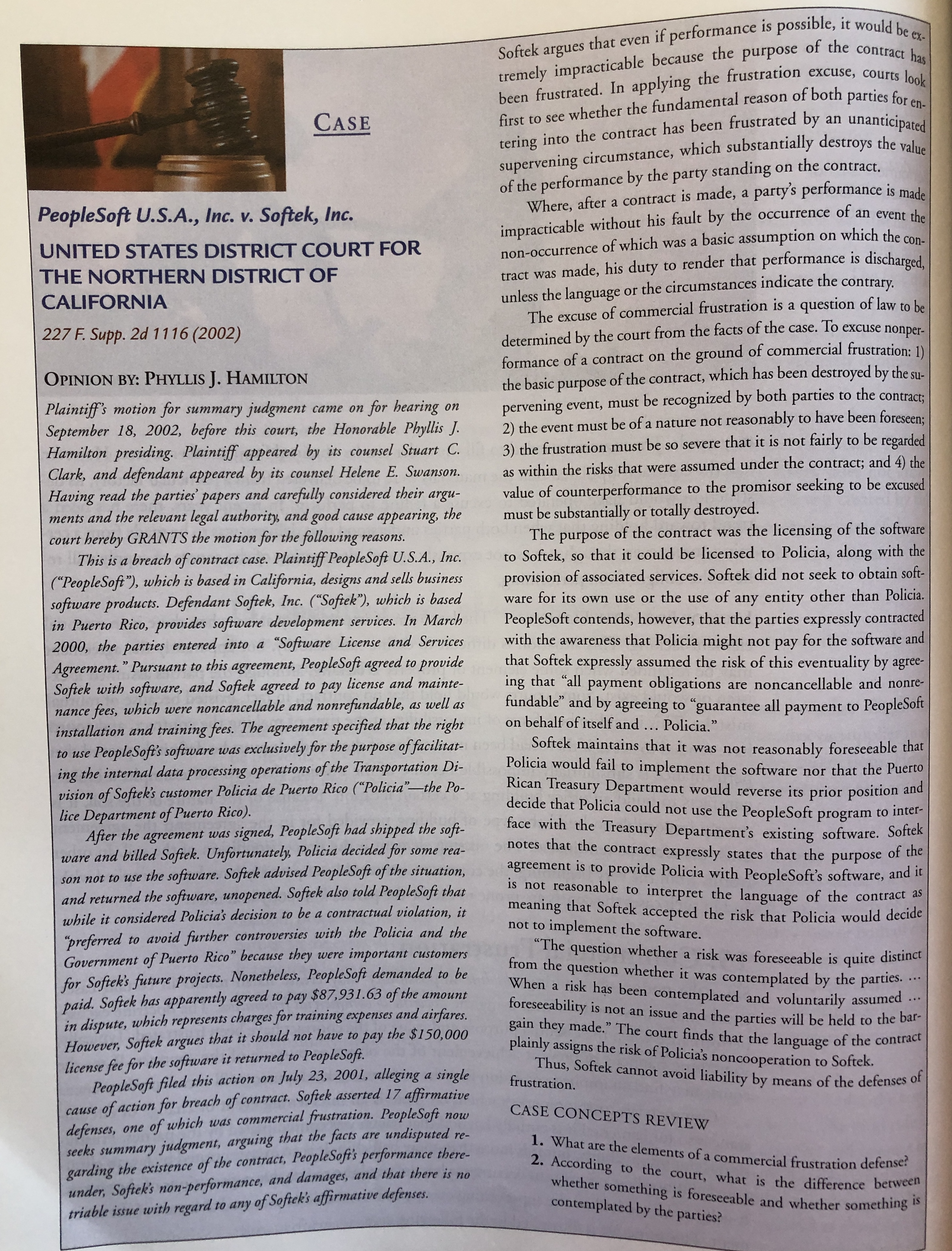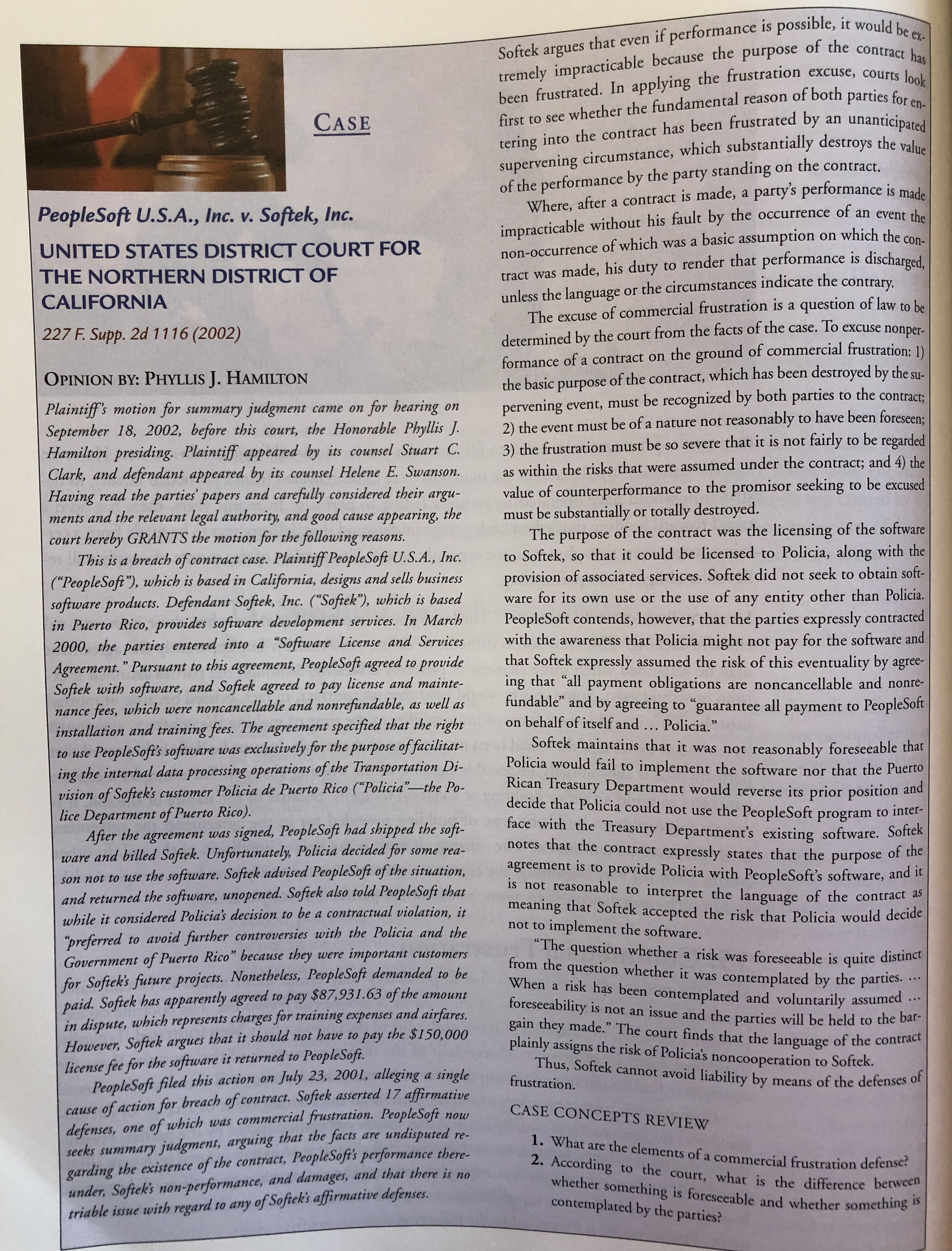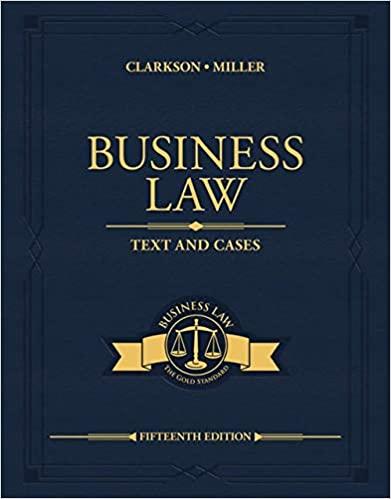
Please read the case study and answer the questions below. I need this as soon as possible!! Thank you so much!!!
- What is the name of the case or article?
- Has the case been filed in a state or federal court?
- What stage is the case in? Pre Trial, Trial, Post Trial?
- Who are the Plaintiffs and Defendants? (If the case has been filed)
- What is the issue? Is the issue one of contracts, statutory law, business formation, operation or closure?
- What are the business organization or operation issues?
- Summarize the facts surrounding the business law issue or dispute, and define each party's position.
- What did the court hold? What was its decision and supporting reasoning?If there is no court holding, what was the end result?
- Describe a short paragraph stating whether you support, or do not support, the decision.
Softek argues that even if performance is possible, it would be ex- tremely impracticably because the purpose of the contract has been frustrated. In applying the frustration excuse, courts look CASE first to see whether the fundamental reason of both parties for en- tering into the contract has been frustrated by an unanticipated supervening circumstance, which substantially destroys the value of the performance by the party standing on the contract. PeopleSoft U.S.A., Inc. v. Softek, Inc. Where, after a contract is made, a party's performance is made impracticable without his fault by the occurrence of an event the UNITED STATES DISTRICT COURT FOR non-occurrence of which was a basic assumption on which the con- THE NORTHERN DISTRICT OF tract was made, his duty to render that performance is discharged, CALIFORNIA unless the language or the circumstances indicate the contrary. 227 F. Supp. 2d 1116 (2002) The excuse of commercial frustration is a question of law to be determined by the court from the facts of the case. To excuse nonper- formance of a contract on the ground of commercial frustration: 1) OPINION BY: PHYLLIS J. HAMILTON the basic purpose of the contract, which has been destroyed by the su- Plaintiff's motion for summary judgment came on for hearing on pervening event, must be recognized by both parties to the contract; September 18, 2002, before this court, the Honorable Phyllis J. 2) the event must be of a nature not reasonably to have been foreseen; Hamilton presiding. Plaintiff appeared by its counsel Stuart C. 3) the frustration must be so severe that it is not fairly to be regarded Clark, and defendant appeared by its counsel Helene E. Swanson. as within the risks that were assumed under the contract; and 4) the Having read the parties' papers and carefully considered their argu- value of counterperformance to the promisor seeking to be excused ments and the relevant legal authority, and good cause appearing, the must be substantially or totally destroyed. court hereby GRANTS the motion for the following reasons. The purpose of the contract was the licensing of the software This is a breach of contract case. Plaintiff PeopleSoft U.S.A., Inc. to Softek, so that it could be licensed to Policia, along with the ("PeopleSoft"), which is based in California, designs and sells business provision of associated services. Softek did not seek to obtain soft- software products. Defendant Softek, Inc. ("Softek"), which is based ware for its own use or the use of any entity other than Policia. in Puerto Rico, provides software development services. In March PeopleSoft contends, however, that the parties expressly contracted 2000, the parties entered into a "Software License and Services with the awareness that Policia might not pay for the software and Agreement. " Pursuant to this agreement, PeopleSoft agreed to provide that Softek expressly assumed the risk of this eventuality by agree- Softek with software, and Softek agreed to pay license and mainte- ing that "all payment obligations are noncancellable and nonre- nance fees, which were noncancellable and nonrefundable, as well as fundable" and by agreeing to "guarantee all payment to PeopleSoft installation and training fees. The agreement specified that the right on behalf of itself and ... Policia." to use PeopleSoft's software was exclusively for the purpose of facilitat Softek maintains that it was not reasonably foreseeable that ing the internal data processing operations of the Transportation Di- Policia would fail to implement the software nor that the Puerto vision of Softek's customer Policia de Puerto Rico ("Policia"-the Po- Rican Treasury Department would reverse its prior position and lice Department of Puerto Rico). decide that Policia could not use the PeopleSoft program to inter- After the agreement was signed, PeopleSoft had shipped the soft- face with the Treasury Department's existing software. Softek ware and billed Softek. Unfortunately, Policia decided for some rea- notes that the contract expressly states that the purpose of the son not to use the software. Softek advised PeopleSoft of the situation, agreement is to provide Policia with PeopleSoft's software, and it and returned the software, unopened. Softek also told PeopleSoft that is not reasonable to interpret the language of the contract as while it considered Policia's decision to be a contractual violation, it meaning that Softek accepted the risk that Policia would decide "preferred to avoid further controversies with the Policia and the not to implement the software. Government of Puerto Rico" because they were important customers "The question whether a risk was foreseeable is quite distinct for Softek's future projects. Nonetheless, PeopleSoft demanded to be from the question whether it was contemplated by the parties. ... paid. Softek has apparently agreed to pay $87,931.63 of the amount When a risk has been contemplated and voluntarily assumed ... in dispute, which represents charges for training expenses and airfares. foreseeability is not an issue and the parties will be held to the bar- However, Softek argues that it should not have to pay the $150,000 gain they made." The court finds that the language of the contract license fee for the software it returned to PeopleSoft. plainly assigns the risk of Policia's noncooperation to Softek. PeopleSoft filed this action on July 23, 2001, alleging a single frustration. Thus, Softek cannot avoid liability by means of the defenses of cause of action for breach of contract. Softek asserted 17 affirmative defenses, one of which was commercial frustration. PeopleSoft now CASE CONCEPTS REVIEW seeks summary judgment, arguing that the facts are undisputed re- garding the existence of the contract, PeopleSoft's performance there- 1. What are the elements of a commercial frustration defense? under, Softek's non-performance, and damages, and that there is no 2. According to the court, what is the difference between triable issue with regard to any of Softek's affirmative defenses. whether something is foreseeable and whether something is contemplated by the parties








